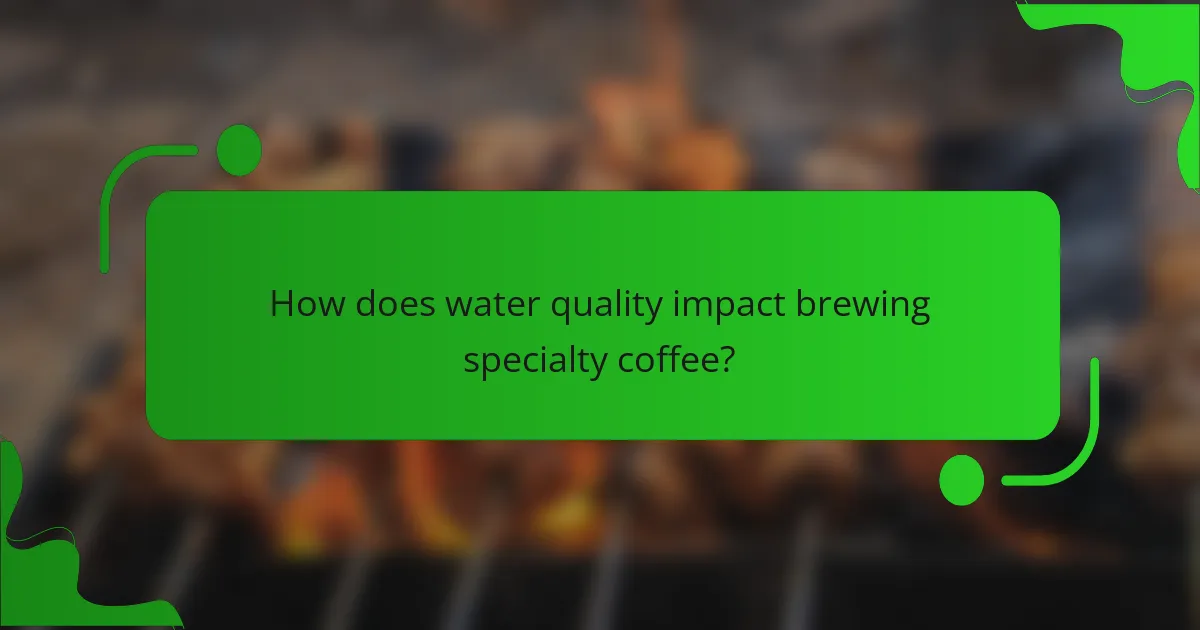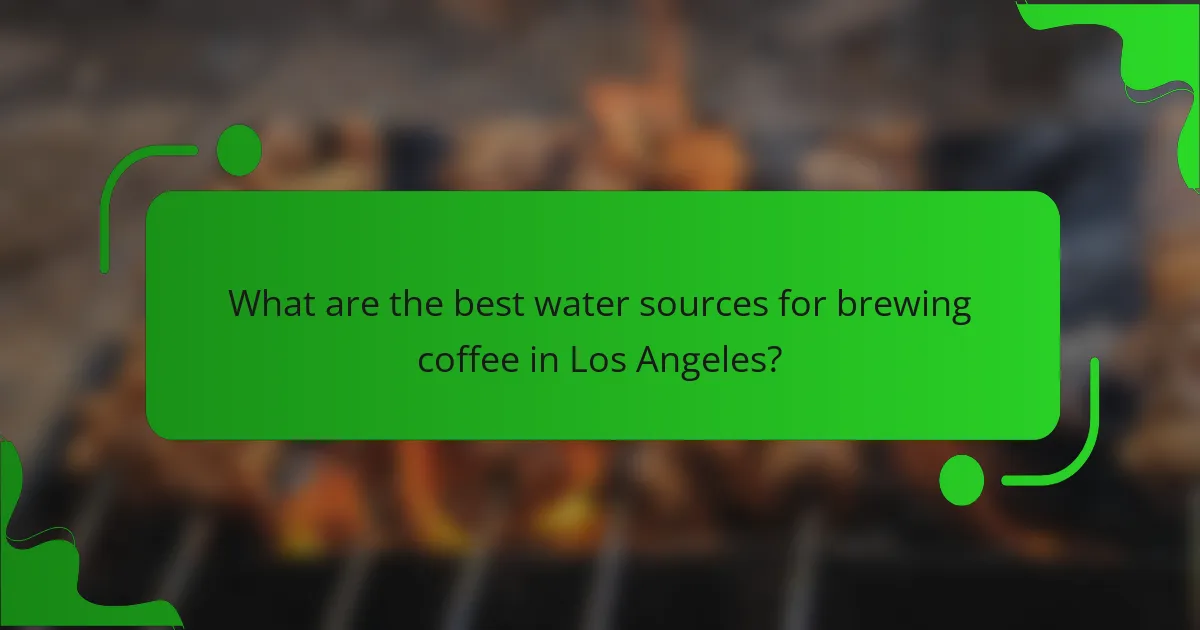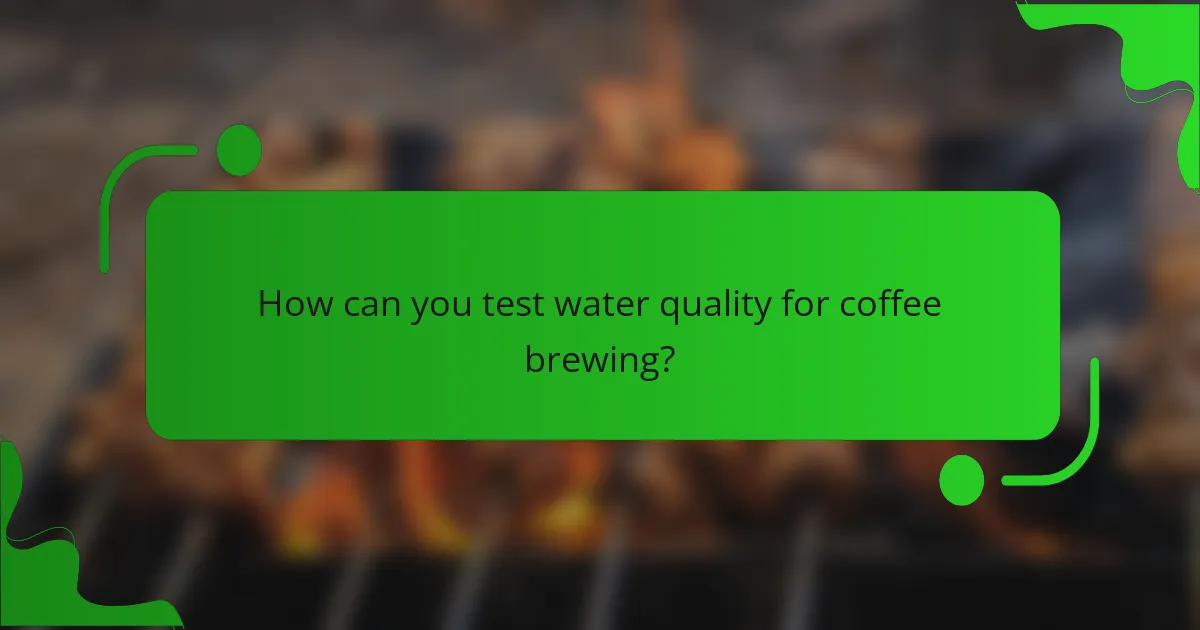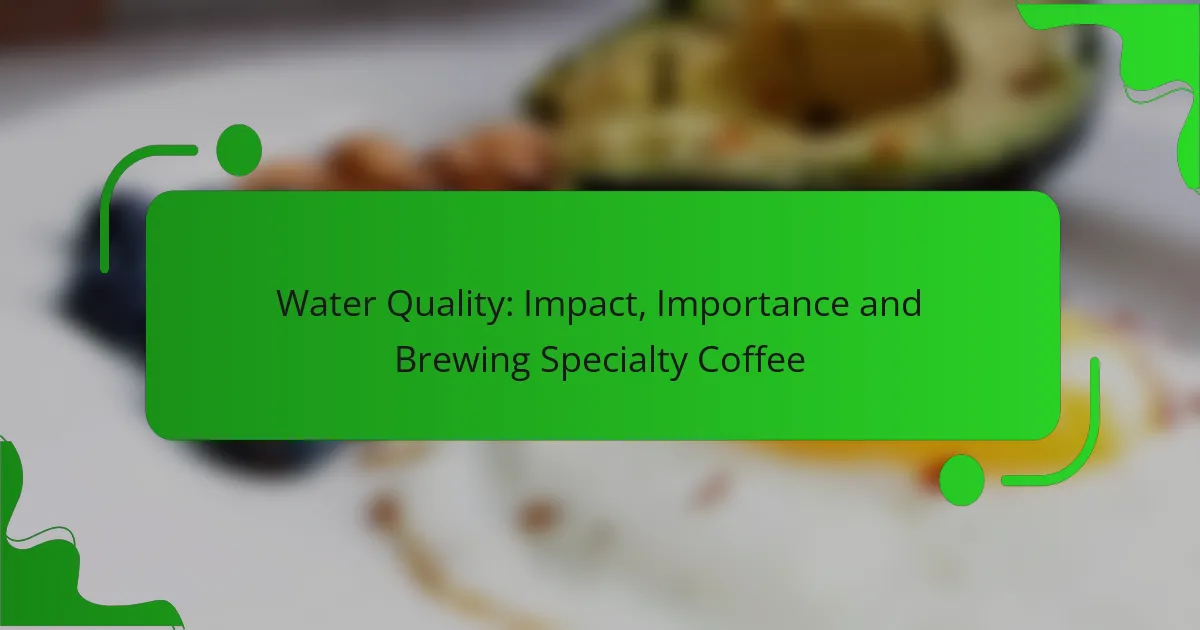Water quality plays a crucial role in brewing specialty coffee, as it directly impacts flavor, extraction efficiency, and the overall quality of the beverage. Factors such as mineral content, pH levels, and impurities like chlorine can significantly alter the taste and aroma of your coffee. Understanding the best water sources and testing methods can help ensure that you achieve the perfect cup every time.

How does water quality impact brewing specialty coffee?
Water quality significantly affects the brewing of specialty coffee by influencing flavor, extraction efficiency, and overall beverage quality. Factors such as mineral content, pH levels, and the presence of chlorine can alter the taste and aroma of the final cup.
Influence on flavor profile
The flavor profile of specialty coffee is heavily influenced by the water used during brewing. Water that is too soft may result in a flat taste, while overly hard water can lead to bitterness. Ideally, water should have a balanced mineral content to enhance the coffee’s natural flavors.
For optimal flavor extraction, aim for water that contains around 100-200 mg/L of total dissolved solids (TDS). This range helps to highlight the coffee’s unique characteristics without overpowering them.
Effects on extraction efficiency
Water quality directly impacts extraction efficiency, which is the process of dissolving soluble compounds from coffee grounds. If the water is not at the right temperature or composition, extraction can be uneven, leading to under-extracted or over-extracted coffee.
To maximize extraction efficiency, use water heated to around 90-96°C (194-205°F) and ensure it has a balanced mineral profile. This combination helps achieve a well-rounded cup with desirable flavors and aromas.
Role of mineral content
Mineral content in water plays a crucial role in coffee brewing, affecting both flavor and extraction. Key minerals like calcium, magnesium, and bicarbonate contribute to the overall taste and mouthfeel of the coffee.
For example, calcium enhances sweetness and body, while magnesium can improve flavor clarity. A balanced mineral content is essential, with a general recommendation of 50-150 mg/L of calcium and magnesium combined for brewing specialty coffee.
Impact of pH levels
The pH level of water influences the extraction of coffee compounds. Water with a neutral pH (around 7) is ideal, as it allows for optimal extraction without introducing unwanted acidity or bitterness.
Water that is too acidic (below pH 6) can lead to sour flavors, while alkaline water (above pH 8) may result in a flat taste. Regularly testing and adjusting water pH can help maintain a consistent brewing quality.
Importance of chlorine removal
Chlorine and chloramine, often present in municipal water supplies, can negatively affect the taste of brewed coffee. These chemicals impart a chemical flavor that can overpower the coffee’s natural characteristics.
To ensure the best flavor, it is crucial to remove chlorine from water before brewing. This can be achieved through methods such as carbon filtration or letting water sit for 24 hours to allow chlorine to dissipate. Regularly checking for chlorine levels can help maintain water quality for brewing specialty coffee.

What are the best water sources for brewing coffee in Los Angeles?
The best water sources for brewing coffee in Los Angeles include filtered tap water, bottled spring water, and reverse osmosis water. Each option has its own benefits and considerations that can significantly affect the flavor and quality of your coffee.
Filtered tap water
Filtered tap water is a convenient and cost-effective choice for brewing coffee in Los Angeles. It removes impurities and chlorine, which can negatively impact the taste. Using a good-quality filter can enhance the water’s mineral content, making it more suitable for coffee extraction.
When selecting a filter, look for options that meet NSF/ANSI standards for water quality. Regularly replace filter cartridges to maintain optimal performance and flavor.
Bottled spring water
Bottled spring water is another excellent option for brewing coffee, as it typically contains natural minerals that enhance flavor. Many brands offer water sourced from natural springs, which can provide a refreshing taste profile.
However, be mindful of the cost and environmental impact of single-use plastic bottles. Consider purchasing larger containers or using refillable options to reduce waste while enjoying quality water for your coffee.
Reverse osmosis water
Reverse osmosis (RO) water is highly purified, removing most contaminants and minerals. While this results in clean water, it may lack the minerals that contribute to a balanced coffee flavor. Some coffee enthusiasts prefer to add minerals back into RO water to improve taste.
When using RO water, consider blending it with filtered or spring water to achieve a better flavor profile. This approach allows you to control the mineral content while ensuring a clean brewing experience.

How can you test water quality for coffee brewing?
To test water quality for coffee brewing, you can use water testing kits or opt for laboratory analysis. These methods help assess key parameters like pH, hardness, and mineral content, which significantly affect the flavor and extraction of coffee.
Using water testing kits
Water testing kits are convenient tools that allow you to check the quality of your brewing water at home. These kits typically measure pH, total dissolved solids (TDS), and hardness, providing a quick overview of water composition.
When selecting a testing kit, look for one that includes easy-to-read color charts and clear instructions. Many kits are affordable, often priced between $10 to $50, making them accessible for coffee enthusiasts.
Laboratory analysis options
For a more comprehensive assessment, consider sending a water sample to a laboratory for analysis. This option can provide detailed insights into mineral concentrations, contaminants, and other specific characteristics of your water.
Laboratory tests can range from $30 to $100, depending on the depth of analysis. This method is particularly useful for coffee shops or serious brewers who want to optimize their water for the best flavor extraction.

What are the recommended water quality parameters for coffee brewing?
For optimal coffee brewing, water quality parameters such as hardness, total dissolved solids (TDS), and pH are crucial. These factors significantly influence the extraction process and the final taste of the coffee.
Ideal hardness levels
Hardness in water is primarily determined by the concentration of calcium and magnesium ions. The ideal hardness level for brewing coffee typically ranges from 50 to 175 mg/L. Water that is too soft may lead to under-extraction, while excessively hard water can result in over-extraction and undesirable flavors.
To achieve the best results, aim for a balanced hardness that enhances flavor without overpowering the coffee’s natural characteristics. Regular testing can help maintain these levels.
Optimal TDS range
Total dissolved solids (TDS) refer to the combined content of all inorganic and organic substances in water. For coffee brewing, an optimal TDS range is generally between 150 and 250 mg/L. This range ensures that the water carries enough minerals to enhance flavor extraction without introducing excessive bitterness.
Using a TDS meter can help you monitor and adjust your water quality. If TDS levels are too low, consider adding mineral supplements to improve the flavor profile of your coffee.
Acceptable pH range
The pH level of water affects the solubility of coffee compounds and, consequently, the taste. The acceptable pH range for brewing coffee is typically between 6.5 and 7.5. Water that is too acidic or too alkaline can lead to undesirable flavors and poor extraction.
Testing the pH of your brewing water is essential. If adjustments are necessary, consider using pH stabilizers or blending different water sources to achieve the desired balance.

How can water filtration improve coffee quality?
Water filtration can significantly enhance coffee quality by removing unwanted impurities and ensuring a consistent brewing experience. Clean water not only affects the taste but also the overall clarity and richness of the coffee flavor profile.
Removal of impurities
Water used in brewing coffee often contains minerals, chlorine, and other contaminants that can negatively impact flavor. Filtration systems, such as activated carbon filters or reverse osmosis, effectively eliminate these impurities, resulting in a cleaner taste. Regular testing of water quality can help identify specific contaminants that may require targeted filtration solutions.
Enhancement of flavor clarity
Filtered water allows the natural flavors of the coffee beans to shine through, enhancing the overall clarity of the brew. When impurities are removed, the coffee’s acidity and sweetness become more pronounced, leading to a more enjoyable drinking experience. For instance, using water with balanced mineral content can accentuate the coffee’s unique flavor notes without overwhelming them.
Consistency in brewing
Using filtered water ensures a consistent brewing process, which is crucial for achieving the desired taste in every cup. Variations in water quality can lead to inconsistent extraction, affecting flavor and aroma. By maintaining a stable water profile, coffee enthusiasts can replicate their brewing methods with confidence, resulting in a more predictable and satisfying outcome.

What are the common water filtration systems for coffee?
Common water filtration systems for coffee include reverse osmosis, activated carbon filters, and water softeners. Each system plays a crucial role in improving water quality, which directly impacts the flavor and aroma of brewed coffee.
Reverse Osmosis Systems
Reverse osmosis (RO) systems effectively remove impurities from water by forcing it through a semi-permeable membrane. This process eliminates contaminants such as chlorine, heavy metals, and other dissolved solids, resulting in clean water ideal for brewing coffee.
While RO systems provide high-quality water, they can also strip essential minerals that contribute to coffee flavor. To counter this, consider using a remineralization filter to add back some minerals after filtration.
Activated Carbon Filters
Activated carbon filters are popular for their ability to absorb chlorine, volatile organic compounds, and other impurities that can affect taste. They work by allowing water to pass through a bed of activated carbon, which traps contaminants.
These filters are relatively easy to install and maintain, making them a practical choice for home brewers. However, they may need to be replaced regularly, typically every few months, to ensure optimal performance.
Water Softeners
Water softeners are designed to reduce hardness in water, primarily caused by calcium and magnesium ions. By replacing these ions with sodium or potassium, softeners help prevent scale buildup in coffee machines and improve extraction efficiency.
While softened water can enhance brewing, it’s essential to monitor sodium levels, especially for those on low-sodium diets. A balance between softening and maintaining mineral content is key for optimal coffee flavor.



